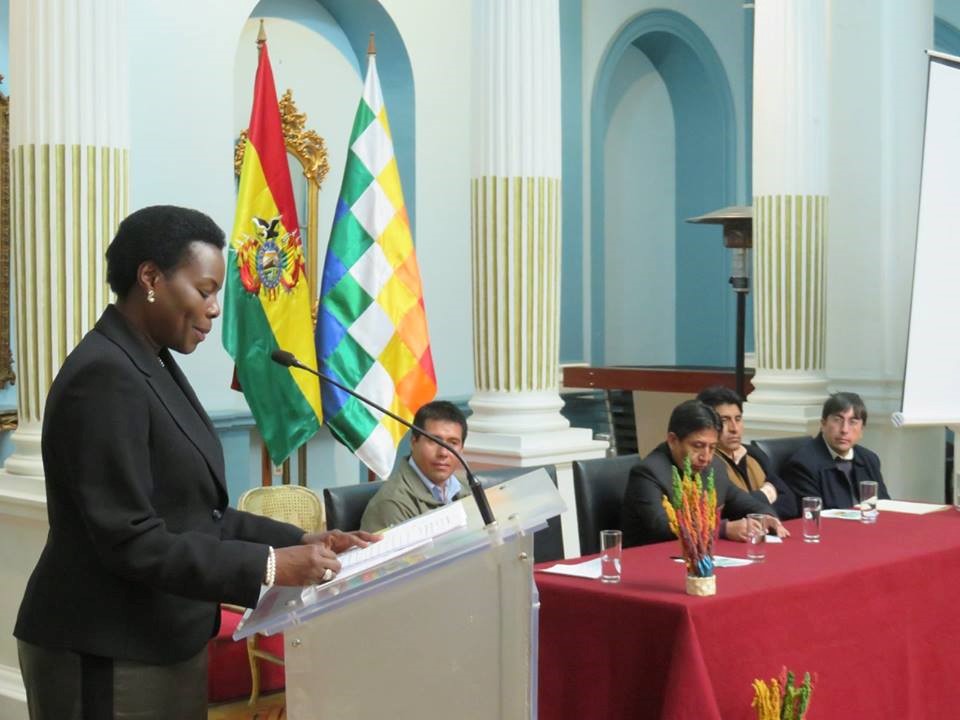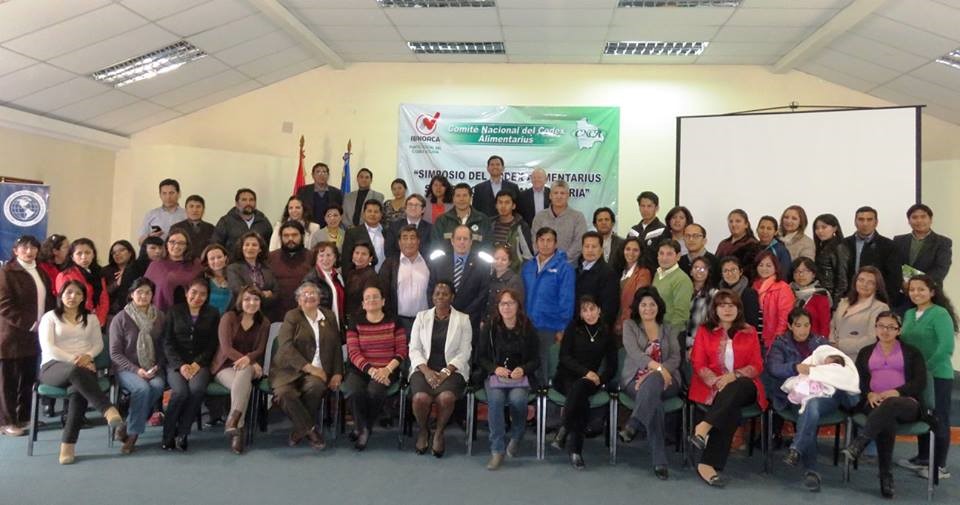Bolivia symposium: the work of Codex in food safety
In order to strengthen the Codex Alimentarius work in Bolivia, the Bolivian Codex Commitee (CNCA) organized a 2 day symposium involving country authorities, food producers, laboratory experts, exporters, universities, consumers and the Chair of Codex Alimentarius Mrs. Awilo Ochieng Pernet. The symposium demonstrated the work of Codex in Food Safety.
First visit of Codex Chair to Bolivia

Held earlier this month, the CNCA workshop successfully highlighted the importance of Food Safety and the relevance of Codex work in the country. For this event, the Chair of Codex, Mrs. Awilo Ochieng Pernet was invited to deliver a series of presentations and this represented the first time Bolivia had welcomed the Chair of Codex to the country.
The opening ceremony was held at the Bolivian Foreign Ministry in the presence of the Minister of Foreign Affairs Mr. David Choquehuanca and the Rural Development and Land Ministry Mr. Cesar Cocarico, as well as 3 other vice ministers, industry representatives, producers and consumers in general.
Food safety and trade in Bolivia
The workshop also included presentations from the FAO regional representative on Food Safety and Quality, Mrs. Marisa Caipo. Over the 2 days, the ministries of Health, Production and Rural Development and Land as well as representatives from agricultural producers, quinoa exporters, quinoa producers, and municipalities presented the Bolivian situation regarding food safety and food trade.
Quinoa
Participants were able to learn how the Codex Alimentarius works and understand how to build a national Food Security Policy. Bolivia is leading the work for the International Codex Quinoa Standard, which should be ready by 2018.

Codex workshop in Bolivia: October 2016
At the heart of the Codex mandate are the core values of collaboration, inclusiveness, consensus building and transparency. Governmental and non-governmental, public and private organizations alike play a vital role in ensuring Codex texts are of the highest quality and based on sound science.
Codex would have little authority in the field of international standard setting if it did not welcome and acknowledge the valuable contributions made by observers. Expert technical bodies, industry and consumer associations
contribute to the standard-setting process in a spirit of openness, collaboration and transparency.
Intergovernmental organizations (IGOs) and international non-governmental organizations (NGOs) can apply for observer status in Codex in order to attend and put forward their views at every stage of the standard-setting process.
 Current Codex Alimentarius Commission
Current Codex Alimentarius Commission
Bolivia symposium: the work of Codex in food safety
In order to strengthen the Codex Alimentarius work in Bolivia, the Bolivian Codex Commitee (CNCA) organized a 2 day symposium involving country authorities, food producers, laboratory experts, exporters, universities, consumers and the Chair of Codex Alimentarius Mrs. Awilo Ochieng Pernet. The symposium demonstrated the work of Codex in Food Safety.
First visit of Codex Chair to Bolivia

Held earlier this month, the CNCA workshop successfully highlighted the importance of Food Safety and the relevance of Codex work in the country. For this event, the Chair of Codex, Mrs. Awilo Ochieng Pernet was invited to deliver a series of presentations and this represented the first time Bolivia had welcomed the Chair of Codex to the country.
The opening ceremony was held at the Bolivian Foreign Ministry in the presence of the Minister of Foreign Affairs Mr. David Choquehuanca and the Rural Development and Land Ministry Mr. Cesar Cocarico, as well as 3 other vice ministers, industry representatives, producers and consumers in general.
Food safety and trade in Bolivia
The workshop also included presentations from the FAO regional representative on Food Safety and Quality, Mrs. Marisa Caipo. Over the 2 days, the ministries of Health, Production and Rural Development and Land as well as representatives from agricultural producers, quinoa exporters, quinoa producers, and municipalities presented the Bolivian situation regarding food safety and food trade.
Quinoa
Participants were able to learn how the Codex Alimentarius works and understand how to build a national Food Security Policy. Bolivia is leading the work for the International Codex Quinoa Standard, which should be ready by 2018.

Codex workshop in Bolivia: October 2016
 Codex and Observer
Codex and Observer
around the world since ancient times.
We might not always know where it comes from,
but we expect it to be available, safe and of good quality.









Leave a comment